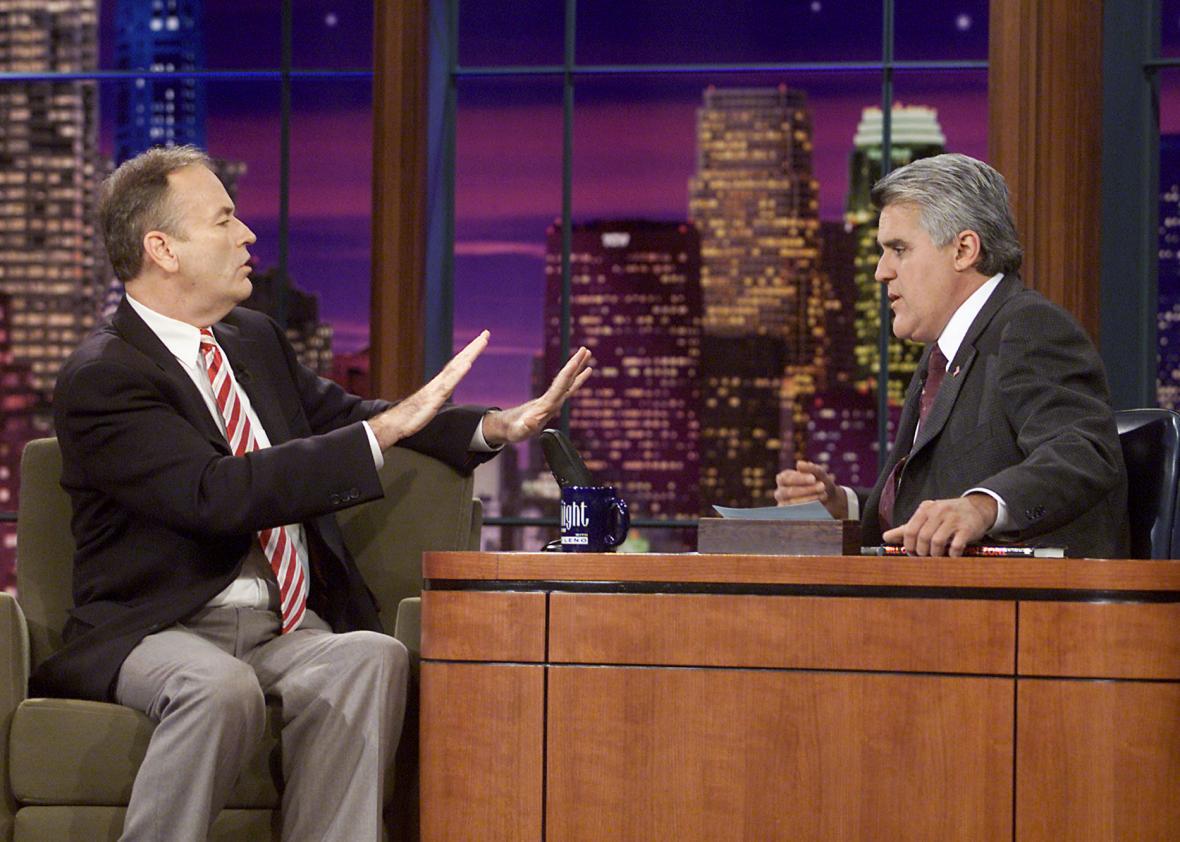Do you believe this story?
Bill O’Reilly, the Fox News talk show host, is in the capital for the Bush inauguration. He is invited to a fancy dinner party. Reluctantly, he accepts, although it is not his kind of thing. According to Newsweek, “O’Reilly said he could feel the socialites and bigwigs ‘measuring’ him. ‘They’re saying, “What’s he doing here?” One couple even got up to leave,’ O’Reilly later recalled.”
Two people left a Washington dinner party rather than share a table with a prole like Bill O’Reilly? Although I wasn’t there, I state baldly: It never happened. That kind of snobbery barely exists in America. (Wednesday’s Wall Street Journal had a front-page feature on country clubs that exclude Jews, treating the matter—correctly—as an odd cultural cul-de-sac, like a town where everyone plays hopscotch or a Web site devoted to whistling.) Certainly, traditional snobbery cannot hope to compete with today’s most powerful social ordering principle: celebrity. O’Reilly, as he himself has been known to admit, has the most popular news show on cable. His book, The O’Reilly Factor (named after the show), was a No. 1 best seller. When he appears at an “A-list” (Newsweek’s label) social function, nobody wonders, “What’s he doing here?”
Yet O’Reilly, like many other people, clings to the fantasy that he is a stiff among the swells. He plays this chord repeatedly in the book, a potpourri of anecdotes and opinions about life in general and his in particular. He had a very strange experience as a graduate student at Harvard’s Kennedy School of Government (which let the likes of Bill O’Reilly through its ivy-covered gates, he is careful to note, “in an effort to bring all sorts of people together”). Other Kennedy School students, he says, insisted on being called by three names, none of which could be “Vinny, Stevie, or Serge.” Their “clothing was understated but top quality … and their rooms hinted of exotic vacations and sprawling family property. Winter Skiing in Grindelwald? No problem.” They tried to be nice, but Bill was nevertheless humiliated, in a Thai restaurant, to be “the only one who didn’t know how to order my meal in Thai.”
I should explain this last one to those who may not have been aware that Thai is the lingua franca of the American WASP upper class. The explanation is simple. American Jewish parents only one or two generations off the boat often spoke in Yiddish when they didn’t want their children to understand. Italian-Americans used Italian, and so on. But WASPs only had English. (They tried Latin, but tended to forget the declensions after the second martini.) So they adopted Thai, which they use in front of the servants and the O’Reillys of the world as well. (At least it sounds like Thai after the second martini.) When they turn 18, upper-class children attend a secret Thai language school, disguised as a ski resort, in Grindelwald.
The notion that the Kennedy School of Government, populated by swells out of P.G. Wodehouse, reached out to O’Reilly, a poor orphan out of Dickens, as representing the opposite pole of the human experience, would be remarkable enough. But O’Reilly’s chapter on “The Class Factor” (Chapter 1, luckily for me) contains some puzzling counterevidence. “I’m working-class Irish American Bill O’Reilly … pretty far down the social totem pole,” he says. Growing up in the 1960s, he watched his father “exhausting himself commuting from Levittown” to work as an accountant for an oil company. Dad “never made more than $35,000”—which would be $100,000 or more in today’s money.
Oh, the shame of it! O’Reilly has been downward social climbing. He is actually—and I wish I could say this in Thai, to avoid humiliating him with the children—m-i-d-d-l-e c-l-a-s-s. He apparently regards that status with just as much horror as do the toffs of his fevered imagination.
Why fake a humble background? Partly for business reasons: Joe Sixpack versus the elitists is a good posture for any talk show host, especially one on Fox. Partly out of vanity: It makes the climb to your current perch more impressive. Partly for political reasons: Under our system, even conservatives need some plausible theory to qualify for victim status, from which all blessings flow. But mainly out of sheer snobbery. And it’s the only kind of snobbery with any real power in America today: reverse snobbery. Bill O’Reilly pretends (or maybe sincerely imagines) that he feels the sting of status from above. But he unintentionally reveals that he actually fears it more from below. Like most of us.
This is not a terrible thing. Reverse snobbery, unlike the traditional kind, is a tribute to democracy—it’s egalitarianism overshooting the mark. And it is a countervailing social force against growing economic disparity. But when you’re faking it, if you’re not careful, reverse snobbery can look a lot like the traditional kind. Bill O’Reilly told Newsweek he would never patronize a Starbucks, because he prefers a Long Island coffee shop “where cops and firemen hang out.” Guess what, Bill! Cops and firemen like good coffee too! And they can afford it. Starbucks is one of the great democratizing institutions of our time. You’d know that if you went in there occasionally. You snob.
